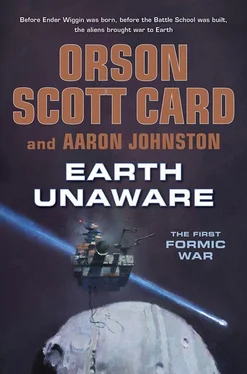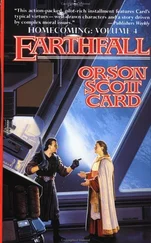Orson Card - Earth unavare
Здесь есть возможность читать онлайн «Orson Card - Earth unavare» весь текст электронной книги совершенно бесплатно (целиком полную версию без сокращений). В некоторых случаях можно слушать аудио, скачать через торрент в формате fb2 и присутствует краткое содержание. Жанр: Фантастика и фэнтези, на английском языке. Описание произведения, (предисловие) а так же отзывы посетителей доступны на портале библиотеки ЛибКат.
- Название:Earth unavare
- Автор:
- Жанр:
- Год:неизвестен
- ISBN:нет данных
- Рейтинг книги:5 / 5. Голосов: 1
-
Избранное:Добавить в избранное
- Отзывы:
-
Ваша оценка:
- 100
- 1
- 2
- 3
- 4
- 5
Earth unavare: краткое содержание, описание и аннотация
Предлагаем к чтению аннотацию, описание, краткое содержание или предисловие (зависит от того, что написал сам автор книги «Earth unavare»). Если вы не нашли необходимую информацию о книге — напишите в комментариях, мы постараемся отыскать её.
Earth unavare — читать онлайн бесплатно полную книгу (весь текст) целиком
Ниже представлен текст книги, разбитый по страницам. Система сохранения места последней прочитанной страницы, позволяет с удобством читать онлайн бесплатно книгу «Earth unavare», без необходимости каждый раз заново искать на чём Вы остановились. Поставьте закладку, и сможете в любой момент перейти на страницу, на которой закончили чтение.
Интервал:
Закладка:
Shots from the trees to the north pegged into the dirt around them. Intentional misses. Something to get the blood up.
Rough hands lifted Wit to his feet, and the men retreated to the south tree line, maintaining a defensive wall around Wit. One of the New Zealanders laid down cover fire, having set his P87 to three-round bursts. Mazer grabbed three rucksacks and followed. The men set up a defensive position in the trees and emptied one of the rucksacks. Mazer found the coordinates and compass and mapped out a route.
Once their destination was known and they felt safe from enemy fire, the real discussion began. Everything was considered. There was a sniper to the north. There were two rucksacks still in the field. The three rucksacks they had recovered all had the same equipment, so they weren’t likely to find anything new in the other two sacks. They had limited ammunition. The forests narrowed at some spots, which were ideal locations for an ambush. They had water, yes, but no food. And the clock was ticking.
Wit noted how each of the men spoke calmly and intelligently, pointing out potential dangers or possible alterations to their route. A few of the suggestions Wit hadn’t considered, and he was pleased to see that the others recognized the wisdom of these comments. No one tried to talk over anyone else, and each of them was humble enough to recognize an idea better than their own.
All of them were aware that Wit was watching them, of course. They knew that this moment was as important as any action they would undertake along the way. And yet it was clear to Wit that none of them was trying to impress him. This was how they had been trained to act. Orderly, efficiently, cohesively, and without ego.
Mazer Rackham turned to Wit. “Are you a soldier, sir, as well as a diplomat in this exercise? Meaning, for the purpose of our exercise, do you know how to fire this weapon?”
“Yes I do.”
“And will you use it to defend yourself to the best of your ability?”
“Yes I will.”
Mazer immediately surrendered his rifle to Wit.
A second soldier spoke up. “Sir, as a diplomat familiar with this hostile scenario, do you have any intel about the men seeking to harm you?”
Wit smiled. Normal soldiers would treat Wit as nothing more than a warm body to pull along. Pumping him for information would be against the “rules.” These men knew better. “I know our enemy well,” said Wit. “Both their skills and their tactics.”
The questions came fast. How many men? What are their strengths? What weapons do they possess? Where might they take positions? How are they communicating?
Twice the group picked up and moved their location, never staying in one spot for long. When the questions were exhausted they modified their route and made preparations to move. The first objective was to retrieve the last two rucksacks.
Rather than venture into the open, three of the men spent half an hour hunting down the sniper, who had hid himself in a tree. The sniper put up little resistance. Once he had been spotted, he allowed himself to be shot, and his dampening suit glowed red.
The New Zealanders retrieved the last two sacks and then, with Wit, moved east toward the safe house. They advanced with two men far out front, sweeping ahead of them. Two others protected Wit in the middle-though one of these, Mazer Rackham, was now unarmed. The last man took up the rear.
The ambush came two kilometers later.
Two of the New Zealanders went down, their bodies twitching, before any of the others had returned fire. The MOPs were all around them, in trees, behind logs, tucked in foxholes.
Wit fired three shots, and three dampening suits glowed red in the trees. Two more shots, and two foxholes became quiet. The remaining New Zealanders took out another three MOPs before pulling Wit away to the south. Mazer Rackham, Wit noticed, had retrieved a weapon from one of the fallen soldiers. Spider rounds pinged into the trees and undergrowth around them.
Seventy meters later, they were clear, hustling toward a ravine.
They moved quickly, taking a circuitous route up the ravine, staying close and moving cautiously. Despite the weight of the rucksacks and the rush of adrenaline from the firefight, no one seemed winded.
“Why did you give me your weapon?” Wit asked Mazer. “By arming me, you put me further into the fight. You drew more fire to me since I was now a threat to our enemy as well as a target.”
“They were going to be shooting at you anyway, sir. And after weighing the advantages, after considering all we had to gain by arming you, I took that risk.”
“What advantages?”
“You’re more familiar with our pursuers. You’re a decorated and skilled soldier, so you’ll be at least as vigilant as I am. You also know our ammunition better than I do, so you’re more familiar with its velocity and other targeting considerations. You also intimately know the weapon and all of its capabilities. I don’t. Which means you’re probably a better shot than I am. Considering how you performed back there, I see that I was right. Most importantly, you have the capacity to defend yourself. In the chaos of a fight, we may not see all the threats to you. If something escapes our notice, you have the ability to eliminate that threat. Our mission is not to survive, sir. Our mission is to get you to the safe house. If you’re armed, you might be able to reach it even if the rest of us are dead.”
Wit stopped moving. “Halt.”
The three men stopped.
“We should keep moving, sir,” said one of the other soldiers. “The safe house is only two kilometers away, and our position has been compromised.”
“There is no safe house,” said Wit. “It’s an empty field. We’ve gone far enough.”
“The exercise is over?”
“Yes, it is. Come with me, gentlemen.” Wit entered a command on his handheld.
Five minutes later they were down from the ravine, where a dozen MOPs soldiers were waiting. The two New Zealanders who had been shot in the ambush were there as well, visibly disappointed, certain they had failed.
“Congratulations, gentlemen,” said Wit. “All five of you have passed this preliminary exercise. My objective was to witness how you functioned as a team, and you did not disappoint. Your actions were especially impressive considering that each of you were handpicked from different units and had never worked together before. This suggests to me that you could easily be integrated into our team should you pass our screening. I should forewarn you, however. The screening is difficult. If any of you have had second thoughts and would rather not participate, now’s the time to say so.”
No one spoke.
“Very well,” said Wit. “As soon as you wake up, we’ll begin.”
One of the New Zealander’s looked confused. “Wake up, sir?”
Five MOPs raised handguns and shot the five New Zealanders with tranquilizers. The New Zealanders looked surprised. Then their eyes rolled back and they dropped.
Wit sat in the back of a rented semitrailer truck, heading northwest on Route 1 into Auckland. The trailer was long and wide and well ventilated, with more than enough room for the five men sleeping on stretchers.
Wit didn’t particularly enjoy shooting men with tranquilizers. Especially skilled and capable soldiers who had served their country well. Yet Wit knew it was a necessity. He needed men who were utterly ruthless in the execution of their duty, and the screening, as ugly as it was, as inhumane as it was, measured exactly what Wit needed to know.
A short Filipino soldier named Calinga walked up the line of stretchers, pausing at each one to check the men’s vitals. When he finished he sat beside Wit and gestured to the stretchers. “Who do you think will pass?”
Читать дальшеИнтервал:
Закладка:
Похожие книги на «Earth unavare»
Представляем Вашему вниманию похожие книги на «Earth unavare» списком для выбора. Мы отобрали схожую по названию и смыслу литературу в надежде предоставить читателям больше вариантов отыскать новые, интересные, ещё непрочитанные произведения.
Обсуждение, отзывы о книге «Earth unavare» и просто собственные мнения читателей. Оставьте ваши комментарии, напишите, что Вы думаете о произведении, его смысле или главных героях. Укажите что конкретно понравилось, а что нет, и почему Вы так считаете.











